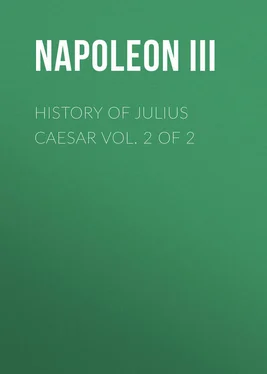Napoleon III - History of Julius Caesar Vol. 2 of 2
Здесь есть возможность читать онлайн «Napoleon III - History of Julius Caesar Vol. 2 of 2» — ознакомительный отрывок электронной книги совершенно бесплатно, а после прочтения отрывка купить полную версию. В некоторых случаях можно слушать аудио, скачать через торрент в формате fb2 и присутствует краткое содержание. Жанр: foreign_antique, foreign_prose, Биографии и Мемуары, на английском языке. Описание произведения, (предисловие) а так же отзывы посетителей доступны на портале библиотеки ЛибКат.
- Название:History of Julius Caesar Vol. 2 of 2
- Автор:
- Жанр:
- Год:неизвестен
- ISBN:нет данных
- Рейтинг книги:4 / 5. Голосов: 1
-
Избранное:Добавить в избранное
- Отзывы:
-
Ваша оценка:
- 80
- 1
- 2
- 3
- 4
- 5
History of Julius Caesar Vol. 2 of 2: краткое содержание, описание и аннотация
Предлагаем к чтению аннотацию, описание, краткое содержание или предисловие (зависит от того, что написал сам автор книги «History of Julius Caesar Vol. 2 of 2»). Если вы не нашли необходимую информацию о книге — напишите в комментариях, мы постараемся отыскать её.
History of Julius Caesar Vol. 2 of 2 — читать онлайн ознакомительный отрывок
Ниже представлен текст книги, разбитый по страницам. Система сохранения места последней прочитанной страницы, позволяет с удобством читать онлайн бесплатно книгу «History of Julius Caesar Vol. 2 of 2», без необходимости каждый раз заново искать на чём Вы остановились. Поставьте закладку, и сможете в любой момент перейти на страницу, на которой закончили чтение.
Интервал:
Закладка:
Прочитайте эту книгу целиком, купив полную легальную версию на ЛитРес.
Безопасно оплатить книгу можно банковской картой Visa, MasterCard, Maestro, со счета мобильного телефона, с платежного терминала, в салоне МТС или Связной, через PayPal, WebMoney, Яндекс.Деньги, QIWI Кошелек, бонусными картами или другим удобным Вам способом.
1
Justin, XXIV. 4. – Titus Livius, V. 48.
2
Polybius, II. 17-19. – Titus Livius, V. 35.
3
Pausanias, X. 19-23. – Diodorus Siculus, Eclog. , XXII. 13.
4
Strabo, IV. p. 156, edit. Dübner and Müller. – Justin, XXXII. 3.
5
Polybius, IV. 46.
6
Justin, XXV. 2. – Titus Livius, XXXVIII. 16. – Pausanias, VII. 6, § 5.
7
Polybius, XXXIII. 7, 8. – Titus Livius, Epitome , XLVII.
8
Strabo, IV., p. 169.
9
Titus Livius, Epitome , LX.
10
Titus Livius, Epitome , LXI.
11
Strabo, IV., pp. 154, 159. – Titus Livius, Epitome , LXI. – Florus, III. 2. – Velleius Paterculus, II. 10.
12
Lucan, I. 424.
13
Cæsar, De Bello Gallico , I. 45. – Strabo, IV., p. 158.
14
Titus Livius, Epitome , LXII. – Eutropius, IV. 10. – Velleius Paterculus, I. 15.
15
Strabo, VII., p. 243.
16
This victory was gained by the Tigurini, a people of Helvetia, on the territory of the Allobroges. According to the Epitome of Titus Livius (LXV.), the battle took place in the district of the Nitiobriges, a people inhabiting the banks of the Garonne, which is not very probable.
17
After pillaging the temple of Toulouse.
18
Titus Livius, Epitome , LXVII. – Tacitus, Germania , 37.
19
Jugurtha , 114.
20
Orat. de Provinciis Consularibus , 13.
21
Orat. de Provinciis Consularibus , 13.
22
The fugitives from Vienne founded the town which subsequently took the name of Lugdunum , in a place called Condate , which is synonymous with confluence. (Dio Cassius, XLVI. 50.)
23
Orat. de Provinciis Consularibus , 13.
24
Jugurtha , 114.
25
Cicero, Orat. de Provinciis Consularibus , 13.
26
Cicero, Epist. ad Atticum , I. 19.
27
Plutarch, Cæsar , 41. – Appian, Civil Wars , II. 41.
28
Appian, Civil Wars , II. 41.
29
Plutarch, Cæsar , 41. – Appian, Civil Wars , II. 41.
30
Appian, Civil Wars , II. 41.
31
Cicero, Orat. de Provinciis Consularibus , 11. – Dio Cassius, XL. 50.
32
Cicero, Orat. de Provinciis Consularibus , 14.
33
Cicero, Orat. de Provinciis Cousularibus , 12.
34
It is stated in the “Commentaries” that Cæsar placed in winter quarters four legions among the Belgæ, and the same number among the Ædui. ( De Bello Gallico , VIII. 54.) – “Cæsar had with him but 5,000 men and 300 horse. He had left the rest of his army beyond the Alps.” (Plutarch, Cæsar , 36, and Appian, Civil Wars , II. 34.)
35
Appian, Civil Wars , II. 35.
36
De Bello Gallico , VIII. 55.
37
Suetonius, Cæsar , 68.
38
In Suetonius, Cæsar , 56. – Cicero, Brutus , 75.
39
Preface of Hirtius to Book VIII. of the “Commentaries.”
40
De Bello Gallico , VI. 13.
41
De Bello Gallico , IV. 10.
42
Strabo, IV. 3, p. 160
43
The Narbonnese reminded the Romans of the climate and productions of Italy. (Strabo, IV. 1, p. 147.)
44
Pomponius Mela, who compiled in the first century, from old authors an abridgement of Geography, says that Gaul was rich in wheat and pastures, and covered with immense forests: “Terra est frumenti præcipue ac pabuli forax, et amœna lucis immanibus.” ( De Situ Orbis , III. 2.) – ( De Bello Gallico , I, 16.) – The winter was very early in the north of Gaul. ( De Bello Gallico , IV. 20.) Hence the proverbial expression at Rome of heims Gallica . (Petronius, Satir. 19. – Strabo, IV., 147-161.) – See the “Memoire on the Forests of Gaul” read before the Académie des Inscriptions et Belles-Lettres, by M. Alfred Maury.
45
Strabo, IV., p. 147. – Diodorus Siculus, V. 26.
46
Cæsar, after having said (V. 3) that the forests of the Ardennes extended from the Rhine to the frontier of the Remi, ad initium Remorum , adds (VI. 29) that it extended also towards the Nervii, ad Nervios . Nevertheless, according to chapter 33 of book VI., we believe that this forest extended, across the country of the Nervii, to the Scheldt. How otherwise could Cæsar have assigned to the forests of the Ardennes a length of 500 miles, if it ended at the eastern frontier of the Nervii? This number is, in any case, exaggerated, for from the Rhine (at Coblentz) to the Scheldt, towards Ghent and Antwerp, it is but 300 kilomètres, or 200 miles.
47
De Bello Gallico , VIII. 5.
48
“Citra flumen Ararim … reliqui sese fugæ mandarunt atque in proximas silvas abdiderunt.” ( De Bello Gallico , I. 12.)
49
“Menapii propinqui Eburonum finibus, perpetuis paludibus silvisque muniti.” ( De Bello Gallico , VI. 5.)
50
“(Morini et Menapii) … silvas ac paludes habebant, eo se suaque contulerunt.” ( De Bello Gallico , III. 28.)
51
“(Sugambri) primos Eburonum fines adeunt … non silvæ morantur.” ( De Bello Gallico , VI. 35.)
52
Strabo, p. 163, edit. Didot.
53
De Bello Gallico , IV. 2.
54
Strabo, pp. 121, 155, 170, edit. Didot.
55
“Carpenta Gallorum.” (Florus, I. 13) – “Plurima Gallica (verba) valuerunt, ut reda ac petorritum.” (Quintilian, De Institutione Oratoria , lib. I., cap. v. 57.) – “Petorritum enim est non ex Græcia dimidiatum, sed totum transalpibus, nam est vox Gallica. Id scriptum est in libro M. Varronis quarto decimo Rerum Divinarum ; quo in loco Varro, quum de petorrito dixisset, esse id verbum Gallicum dixit.” (Aulus Gellius, XV. 30.) – “Petoritum et Gallicum vehiculum est, et nomen ejus dictum esse existimant a numero quatuor rotarum. Alii Osce, quod hi quoque petora quatuor vocent. Alii Græce, sed αἱλικὡς dictum.” (Festus, voc. Petoritum , p. 206, edit. Müller.) – “Belgica esseda, Gallicana vehicula. Nam Belga civitas est Galliæ in qua hujusmodi vehiculi repertus est usus.” (Servius, Commentaries on the Georgics of Virgil, lib. III. v. 204. – Cæsar, De Bello Gallico , IV. 33, and passim .
Читать дальшеИнтервал:
Закладка:
Похожие книги на «History of Julius Caesar Vol. 2 of 2»
Представляем Вашему вниманию похожие книги на «History of Julius Caesar Vol. 2 of 2» списком для выбора. Мы отобрали схожую по названию и смыслу литературу в надежде предоставить читателям больше вариантов отыскать новые, интересные, ещё непрочитанные произведения.
Обсуждение, отзывы о книге «History of Julius Caesar Vol. 2 of 2» и просто собственные мнения читателей. Оставьте ваши комментарии, напишите, что Вы думаете о произведении, его смысле или главных героях. Укажите что конкретно понравилось, а что нет, и почему Вы так считаете.












